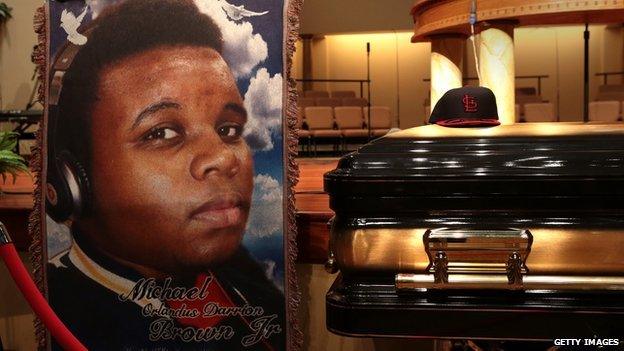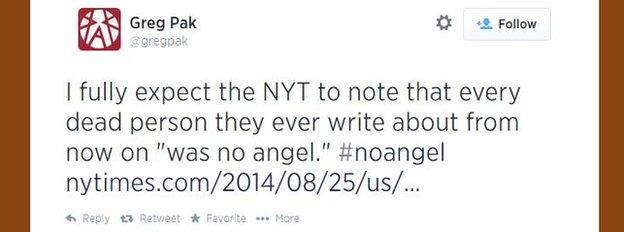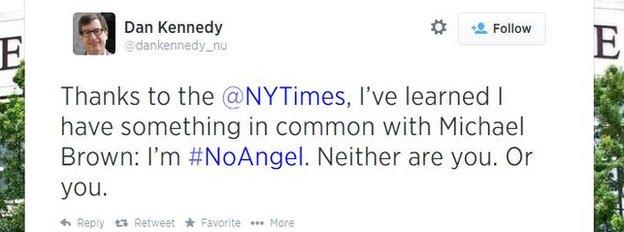Michael Brown 'no angel' controversy
- Published
- comments

The New York Times is under fire for its profile, external of Michael Brown, the unarmed black teenager who was shot to death by police in Ferguson, Missouri, on 9 August.
The article, which was published on Sunday, the day before Mr Brown's funeral, paints an intimate portrait of his life. It also reveals some of the personal struggles he faced in the days leading up to his death.
"Michael Brown, 18, due to be buried on Monday, was no angel, with public records and interviews with friends and family revealing both problems and promise in his young life," writes John Eligon for the New York Times.
Although the piece by Eligon, who is black, is largely sympathetic to the family and memory of Mr Brown, the words "no angel" have stirred up a media frenzy, with some questioning and castigating the New York Times for using the expression.
"So I suppose that, when an undercover officer came upon me and two friends smoking cigarettes and drinking beer on a park bench that night, he could have shot us dead, and then the Times could have reported that we were no angels," writes, external Matthew Yglesias for Vox, recounting a story of his own teenage indiscretions.
Some critics consider Mr Brown's illicit activities a normal part of being a teenager, and not an indictment on his character.
"Teenagers, white and black, rich and poor, are often emotionally volatile, dabble with drugs, listen to rap, attempt to rap and commit petty crimes. Does that mean they deserve to be shot?" asks, external Christopher Massie for the Columbia Journalism Review.
If that's the case, the argument goes, the use of the term 'no angel' takes on racial overtones.
"As with most mainstream media, when it comes to victims of colour, they continue to be victimised and criminalised even in their death," writes, external Yesha Callahan for the Root.
The controversy echoes, external remarks by New York City Mayor Rudy Giuliani following the 2000 police shooting of Patrick Dorismond, who was killed outside of a nightclub after shoving undercover officers. The mayor said the 26-year-old security guard was "no altar boy". It turned out that Dorismond had, in fact, been an altar boy.

A frequent topic of debate is how the use of the term "no angel" plays into cultural stereotypes perpetuated by the media.
"It's as if a black person must be a perfect victim to escape being thuggified, an angel with an unblemished history in order to warrant justice," writes, external author Toure for the Washington Post. "The burden of the perfect victim suggests that only impeccable resumes may qualify for protection under the law and the support of the community."

When asked about the "no angel" debacle, New York Times editor Alison Mitchell told the Washington Post, external: "I think, actually, we have a nuanced story about the young man and if it had been a white young man in the same exact situation, if that's where our reporting took us, we would have written it in the same way."
But after the hashtag #noangel had garnered nearly 3,000 mentions in less than a day, New York Times public editor Margaret Sullivan weighed in, external.
"In my view, the timing of the article (on the day of Mr Brown's funeral) was not ideal," she wrote on Monday afternoon. "And 'no angel' was a blunder."
Sullivan added that reporting, even in the aftermath of someone's death, should not hide details of someone's life.
"[Eligon] said he thought it was important to address parts of Mr Brown's background that are less positive, especially because doing so allowed those close to him to comment," Sullivan writes. "I came away from the profile with a deeper sense of who Michael Brown was, and an even greater sense of sorrow at the circumstances of his death."
(By Annie Waldman)